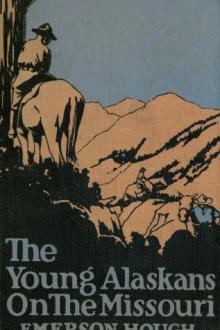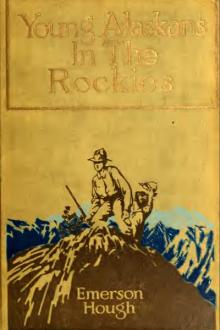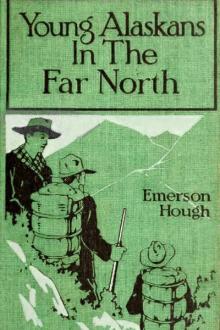The Young Alaskans on the Missouri, Emerson Hough [books to read as a couple .txt] 📗

- Author: Emerson Hough
- Performer: -
Book online «The Young Alaskans on the Missouri, Emerson Hough [books to read as a couple .txt] 📗». Author Emerson Hough
“From all I learn,” said Rob, “this fishing is too easy to be called sport—they lie in all the spring holes and creek mouths. This is the head of the Henry’s Fork of the Snake River, and a great spawning ground. Now, you want to remember you’re not on Missouri waters, but Pacific waters. If Lewis and Clark had come over that shallow gap yonder—the Raynolds Pass, which cuts off the Madison Valley—they’d have been on one of the true heads of the Columbia. But they probably never would have got through, that year, at least.”
The young anglers found that their catch of trout created no enthusiasm at the camp. The cook told them that he didn’t care for these trout very much, because you had to soak them overnight in salt and water to make them fit to eat, they tasted so muddy in the summertime. So they said they would not fish any more at that place.
That evening as they sat about their table engaged with their maps and notebooks, they were joined by Jim, the son of the rancher, a young man still in the half uniform of the returned soldier, with whom they all rapidly made friends, the more so since he proved very well posted in the geography of that part of the country. He readily agreed to take the young explorers on a trip over the Raynolds Pass on the following morning, so that they might get a better idea of the exact situation of the Madison River.
They made an early start, leaving their Uncle Dick and Billy Williams at the ranch to employ themselves as they liked. It was a drive of only a few miles from the northern end of Henry’s Lake, along a very good road, to the crest of the gentle elevation which lay to the northward. The young ranchman pulled up the car at last and pointed to an iron plug driven down into the ground.
“Here’s the Divide,” said he. “You now are on top of the Rocky Mountains, although it doesn’t look like it.”
“Why,” said Jesse, “this looks like almost any sort of prairie country. We have been in lots of places higher than this.”
“Yes,” said his new friend, “you can see lots of places higher than this any way you look. She’s only six thousand nine hundred and eleven feet here. There are snow-topped mountains on every side of you. Where we are right now is the upper line of the state of Idaho. Idaho sticks up in here in a sort of pocket—swings up to the north and then back again. The crest of the Divide is what makes the state line between Montana and Idaho. Four feet that way we are on Idaho ground, but there’s Montana east of us, north of us, and west of us.
“Over southwest, where you came over the Red Rock Pass, is the head of the Missouri. On north of here is the Madison River; it comes in, running northwest out of the upper corner of Yellowstone Park. We could drive down there in a little while to the mouth of the West Fork, but I think we can get better fishing somewhere else.
“If we went on, an hour or so, we would come to the mouth of the Madison Cañon. Up toward the head of that is the big power dam—ninety feet high it is—which cuts off the big Madison, and the South Fork, too. That makes a lake that runs over back into the country. They say it is seventy miles or so around the shore line, I don’t know just how far. That place is full of big fish, and when you catch it just right, there is great sport there. I don’t call it sport to fish for trout under that big dam. They jump and jump there, day after day, until they wear themselves out. There ought to be a ladder in that dam, but there isn’t.”
“I suppose here is where the road comes down from Three Forks, over this Raynold’s Pass,” said John, with pencil in hand, ready to continue his own personal map of the country.
“No, not exactly,” continued the young ranchman. “This road runs up to Virginia City. They tell me that between there and Three Forks the roads are hard to get over.”
“But they come down here from Butte, don’t they?” inquired Rob. “I thought this was right on the Butte road.”
“No, the best road to Butte comes in over Red Rock Pass just exactly where you came in yourselves. Only it runs along to the north side of the Centennial Valley and not on the south side, where you came in. They have to follow up the Red Rock Valley to Dillon, where it comes in from the north. That’s the quickest and easiest way to get between Butte and Henry’s Lake. It is something over a hundred miles.”
“Well, anyway,” argued John, “this is the way Billy Williams will have his car come in from Bozeman.”
“No,” smiled the young man, “you are wrong again on that. The Bozeman road cannot come down the Gallatin, and through to here, south of the Three Forks. When we come over to the edge of Yellowstone Park I will show you how the road runs to Bozeman. It angles in north, to the east of the South Fork of the Madison. Then it crosses the main river and swings off to the northeast, and then north up to Bozeman, in the valley of the Gallatin River.”
“Well,” said Rob, turning to his younger associates, “that seems to give us a pretty good look in at this whole proposition of the Missouri River. We have been on the head of the Jefferson Fork; we are going fishing on the South Fork of the Madison and motor to the head of the North Fork, inside of Yellowstone Park, if we wanted to; and then we are going on up to the Gallatin and maybe east on that to its head in the Bozeman Pass. In that way we would be covering all three of the great tributaries.”
“Yes, and be having some pretty good sport besides,” said the young ranchman. “I will promise you, if you don’t like this lake fishing—I don’t much care for it myself—we will make up a party and go over and camp out on the South Fork of the Madison as soon as your car comes in from Bozeman. I will take my car over, too, and we’ll pick up a young chap about your age, Mr. Rob, at one of the ranches below. His name is Chester Ellicott, and he’s descended from the Andrew Ellicott of Pennsylvania, who taught astronomy to Meriwether Lewis.
“Then we can spend a couple of days or so over there on what I think is the finest fishing river in the world. You will still be right on your road to Bozeman and the Gallatin, because you will then be only about six or eight miles from the town of Yellowstone, and near where the Bozeman road comes in.”
“That certainly does sound mighty good to me,” said Jesse. “I haven’t caught a fish now for a couple of days, except those we caught at the lake this afternoon. There were so many of them, it was too easy.”
“Well,” said their new companion, “you won’t find catching grayling on the South Fork quite so easy as all that. I always liked stream fishing myself better than lake fishing.”
“Do we wade over there, in that stream?” asked Rob. “We haven’t got our waders along, ourselves, not even rubber boots.”
“We’ll fix you up somehow at the place,” responded the other. “My friends in here have all got waders. You could fish from the banks, but it is better to have waders, so you can cross once in a while. There are holes in there ten or fifteen feet deep, and I will show you two or three hundred grayling and white fish on the bottom of some of those holes. The water is clear as air, and just about as cold as ice. You couldn’t have come at a better time for fishing, because the grasshoppers are on now and even the whitefish are feeding on the surface.”
“I wish Billy’s man would hurry up with the car,” complained Jesse. “He said to be down here in about a week. We might have to wait an extra day.”
“Well, out here,” smiled his new-found friend, “we don’t mind waiting a day or so, but I suppose you folks from back in the East get in more of a hurry. Anyhow, we will promise you a good time.”
They now returned to the ranch house at the head of Henry’s Lake, without going on to the Madison River below the mouth of the cañon, where the young rancher thought the fishing would not be so much worth while. To their great surprise, they found yet another car waiting for them at the camp—none less than Billy Williams’s car, with all their camp outfit. This had been brought down from Bozeman by Con O’Brien, one of Billy’s neighbors in the Gallatin, as they learned when they had had time to make inquiries.
“Well, that’s what I call fast work!” said John, after they had shaken hands all round. “Here’s our bed rolls and everything, all waiting for us! Yet we have been two hundred miles from them on one side of the circle, and they’ve been around two or three hundred miles on the other side.”
“Well, the pack train came in from Dillon early yesterday morning,” said Con, “and I already had Billy’s message. So I just unpacked old Sleepy and Nigger, threw the stuff in the car, and hit the trail south.”
“But how did you get here so soon?” demanded Rob. “It must be a good deal over a hundred miles.”
“You don’t know our mountain roads in this country,” smiled Con. “Besides, it is only about ninety miles from Bozeman, the way we figure it. Anyhow, here we are and ready for any sort of frolic you want to name. If I had started a little earlier, I would have been in here last night. But I was fixing up a tire at Yellowstone, so I just thought I would sleep there last night and come out in the morning early.”
“What shall we do, young gentlemen,” asked Uncle Dick. “The day is still young.”
“Well,” said Rob, “I am for heading right back to the South Fork of the Madison and going into camp there for the rest of the trip—that is, until we have to start up to Billy’s ranch.”
They all agreed to this, and accordingly after they had finished their luncheon, they said good-by to the obliging ranchman, whose son, as he had promised, now accompanied them in his own car. In the course of an hour they had picked up the latter’s friend from his ranch at the foot of the Lake and soon were speeding rapidly eastward over the Targhee Pass—once more leaving Idaho and going into the state of Montana; a proposition which they now from their maps could easily understand. They traced out carefully the great southward swing of the Continental Divide which comes through the Yellowstone Park, bends around over to the south, thence swings north and west, making the great mountain pocket which holds all





Comments (0)